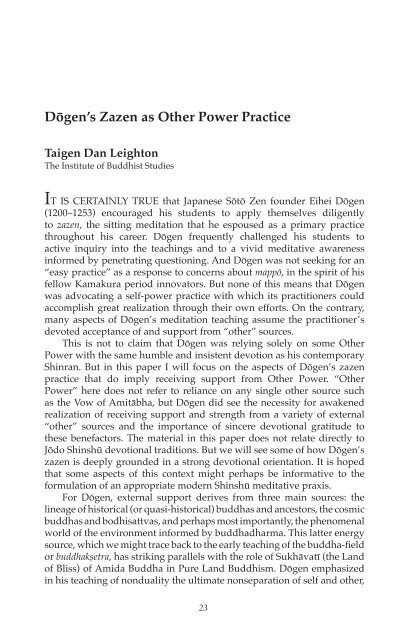PACIFIC WORLD - The Institute of Buddhist Studies
PACIFIC WORLD - The Institute of Buddhist Studies
PACIFIC WORLD - The Institute of Buddhist Studies
You also want an ePaper? Increase the reach of your titles
YUMPU automatically turns print PDFs into web optimized ePapers that Google loves.
Dōgen’s Zazen as Other Power Practice<br />
Taigen Dan Leighton<br />
<strong>The</strong> <strong>Institute</strong> <strong>of</strong> <strong>Buddhist</strong> <strong>Studies</strong><br />
IT IS CERTAINLY TRUE that Japanese Sōtō Zen founder Eihei Dōgen<br />
(1200–1253) encouraged his students to apply themselves diligently<br />
to zazen, the sitting meditation that he espoused as a primary practice<br />
throughout his career. Dōgen frequently challenged his students to<br />
active inquiry into the teachings and to a vivid meditative awareness<br />
informed by penetrating questioning. And Dōgen was not seeking for an<br />
“easy practice” as a response to concerns about mappō, in the spirit <strong>of</strong> his<br />
fellow Kamakura period innovators. But none <strong>of</strong> this means that Dōgen<br />
was advocating a self-power practice with which its practitioners could<br />
accomplish great realization through their own efforts. On the contrary,<br />
many aspects <strong>of</strong> Dōgen’s meditation teaching assume the practitioner’s<br />
devoted acceptance <strong>of</strong> and support from “other” sources.<br />
This is not to claim that Dōgen was relying solely on some Other<br />
Power with the same humble and insistent devotion as his contemporary<br />
Shinran. But in this paper I will focus on the aspects <strong>of</strong> Dōgen’s zazen<br />
practice that do imply receiving support from Other Power. “Other<br />
Power” here does not refer to reliance on any single other source such<br />
as the Vow <strong>of</strong> Amitābha, but Dōgen did see the necessity for awakened<br />
realization <strong>of</strong> receiving support and strength from a variety <strong>of</strong> external<br />
“other” sources and the importance <strong>of</strong> sincere devotional gratitude to<br />
these benefactors. <strong>The</strong> material in this paper does not relate directly to<br />
Jōdo Shinshū devotional traditions. But we will see some <strong>of</strong> how Dōgen’s<br />
zazen is deeply grounded in a strong devotional orientation. It is hoped<br />
that some aspects <strong>of</strong> this context might perhaps be informative to the<br />
formulation <strong>of</strong> an appropriate modern Shinshū meditative praxis.<br />
For Dōgen, external support derives from three main sources: the<br />
lineage <strong>of</strong> historical (or quasi-historical) buddhas and ancestors, the cosmic<br />
buddhas and bodhisattvas, and perhaps most importantly, the phenomenal<br />
world <strong>of</strong> the environment informed by buddhadharma. This latter energy<br />
source, which we might trace back to the early teaching <strong>of</strong> the buddha-field<br />
or buddhakṣetra, has striking parallels with the role <strong>of</strong> Sukhāvatī (the Land<br />
<strong>of</strong> Bliss) <strong>of</strong> Amida Buddha in Pure Land Buddhism. Dōgen emphasized<br />
in his teaching <strong>of</strong> nonduality the ultimate nonseparation <strong>of</strong> self and other,<br />
23

















